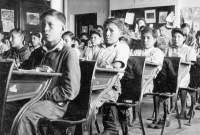Support strong Canadian climate journalism for 2025
The NDP is hoping MPs from other parties will join them in issuing a formal invitation to Pope Francis to apologize to residential school survivors.
NDP MP Charlie Angus said an opposition day motion to be debated Thursday is meant to appeal straight to the pontiff himself.
"We are asking him to work with us, to walk with us as Canadians," Angus said Monday.
"We're not telling the Catholic bishops to do anything," he said. "We are asking the Pope, given his incredible reputation as a social justice leader, to join Canada and to close this chapter."
A papal apology delivered on Canadian soil was one of 94 recommendations of the Truth and Reconciliation Commission.
Bishop Lionel Gendron, who is president of the Canadian Conference of Catholic Bishops, issued a letter to Indigenous Peoples in Canada late last month to say that after carefully considering the request, Pope Francis felt he could not personally respond.
The conference of bishops has since clarified that an apology from the Pope would be inappropriate given the structure of the Roman Catholic Church, and that Canadian bishops would be best placed to keep engaging in reconciliation with Indigenous Peoples.
They also did not rule out an apology coming sometime in the future.
Last week, the NDP and the Liberals asked the House of Commons for unanimous consent to pass a motion that would have asked the conference of bishops to invite Pope Francis to deliver the apology.
It was opposed by Conservative MP Garnett Genuis, who said he did so because he believes in the separation of church and state.
"It is quite unprecedented that Parliament would tell the church how to undertake its reconciliation efforts here," Genuis said at the time.
Angus, however, suggested there was irony in that argument.
"I don't know why we're talking about a division of church and state when the residential schools were the creation of church and state, with the expressed intent of destroying Indigenous identity," Angus said.
"So therefore, church and state have to come together at this point."
The new version of the NDP motion, which also calls on the Catholic Church to release all its records relating to residential schools and to do its best to raise the amount of money it had originally committed to give survivors, would not require unanimous consent to be debated and come to a vote.





Comments